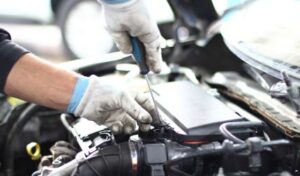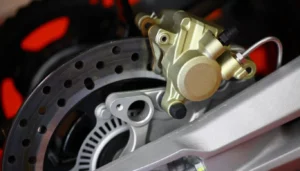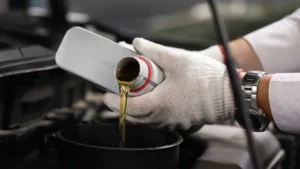You may feel sometimes that while driving your car is vibrating and you don’t have an idea why is this happening. On the go it can trouble you if you car behaves like this.
If you don’t want to get into such kind of situation then you must read the 7 reasons explained below which I have gathered to solve the issues when you are facing this.
7 Reasons Why Your Car is Vibrating?
Car shaking, also referred to as car vibration, is a term used to describe the noticeable oscillation, movement, or trembling of a vehicle while it’s in operation.
This shaking can occur at various times, such as when the car is idling, accelerating, decelerating, or traveling at a constant speed. Car shaking can range from a mild annoyance to a significant safety concern, depending on the severity and the underlying cause.
1. Engine problems
Engine problems can cause your car to shake, and there are several potential issues that could be at the root of the problem. Here are some common engine-related causes for car shaking:
An engine misfire occurs when one or more of the cylinders do not fire properly. This can be due to issues with the spark plugs, ignition coils, fuel injectors, or air-fuel mixture. Misfires often cause the engine to shake and can lead to reduced performance, poor fuel efficiency, and increased emissions.
Worn-out or damaged spark plugs can cause misfires, leading to engine shaking. Replacing old or damaged spark plugs can help restore engine performance and eliminate the vibrations.
Faulty ignition coils can also lead to misfires and engine shaking. If an ignition coil is not providing the proper voltage to the spark plugs, the engine may not fire correctly.
A clogged fuel injector or a malfunctioning fuel pump can disrupt the flow of fuel to the engine, causing it to shake. Cleaning or replacing the fuel injectors and ensuring the fuel pump is functioning properly can help resolve these issues.
A vacuum leak occurs when there is an unintended opening in the intake manifold, allowing uncontrolled air to enter the engine. This can cause an imbalanced air-fuel mixture, leading to engine shaking. Vacuum leaks can be diagnosed by a mechanic and repaired by replacing damaged hoses or gaskets.
The engine mounts hold the engine in place and help absorb vibrations. Worn or damaged engine mounts can cause excessive vibrations that are felt throughout the car. Replacing worn engine mounts can help eliminate these vibrations.
If you suspect that your car’s shaking is due to engine problems, it’s essential to have it inspected by a professional mechanic. They can diagnose the issue, recommend appropriate repairs, and help prevent further damage to your vehicle.
2. Tire issues
Tire issues are a common cause of car shaking, as they can create an imbalance in the vehicle’s movement. Some of the most common tire-related issues that can cause your car to shake include:
If the weight distribution of your tires is uneven, it can cause the wheels to wobble, leading to vibrations felt in the car, especially at higher speeds. To correct this issue, have your tires balanced by a professional.
Improper wheel alignment can cause uneven tire wear and lead to vibrations in the vehicle. Regular wheel alignments can help prevent this issue and extend the life of your tires.
A damaged or deformed tire, such as one with a bulge or flat spot, can cause the car to shake. Inspect your tires for any visible damage and replace them if necessary.
Tires can wear unevenly due to misalignment, improper inflation, or a lack of tire rotation. Unevenly worn tires can cause vibrations in the car. Regular tire maintenance, including rotations and inflation checks, can help prevent uneven wear.
Loose or improperly tightened wheel bolts can cause the wheel to wobble, leading to vibrations. Ensure that your wheel bolts are tightened to the correct specifications.
A wheel that has been damaged or bent, possibly due to hitting a pothole or curb, can cause the car to shake. Inspect your wheels for any visible signs of damage, and have them repaired or replaced as needed.
If you suspect that your car’s shaking is due to tire issues, it’s essential to have your tires inspected by a professional mechanic or tire specialist. They can diagnose the problem, recommend appropriate repairs or maintenance, and help ensure a smoother, safer driving experience.
3. Wheel balance
Wheel balance refers to the even distribution of weight around a vehicle’s wheels and tires. Proper wheel balance is crucial for smooth driving, optimal tire wear, and overall vehicle performance. When wheels are not properly balanced, it can lead to vibrations or shaking in the car, especially at higher speeds.
There are several reasons why wheels might become unbalanced:
Manufacturing imperfections:
Small weight differences in the tire or wheel can lead to an imbalance. While these imperfections are usually minimal, they can cause vibrations when the wheel spins at high speeds.
Tire wear:
As tires wear unevenly over time, their weight distribution can change, leading to an imbalance.
Road hazards:
Hitting potholes, curbs, or other obstacles can cause damage to the wheel or tire, leading to an imbalance.
Loss of wheel weights:
Wheel weights are small metal pieces attached to the wheel to help balance its weight. If these weights become damaged or fall off, the wheel can become unbalanced.
To address wheel balance issues, a mechanic or tire specialist will perform a wheel balancing service. This involves mounting the wheel and tire on a balancing machine, which spins the assembly to identify any imbalances. The technician then attaches small weights to the wheel to counteract the imbalance, restoring even weight distribution.
If your car is shaking, and you suspect that it may be due to wheel balance issues, it’s essential to have your wheels balanced by a professional. Regular tire maintenance, including rotations and balancing services, can help prevent imbalances and ensure a smoother, safer driving experience.
4. Suspension problems
Suspension problems can cause your car to shake or vibrate, affecting the overall comfort and handling of your vehicle. The suspension system is responsible for absorbing road shocks and maintaining tire contact with the road, providing a smooth and stable ride. Several common suspension-related issues can cause car shaking:
Worn or damaged shock absorbers or struts: Shocks and struts help to absorb road impacts and keep the vehicle stable. When they wear out or become damaged, they can no longer effectively dampen road vibrations, leading to a shaky ride. Replacing worn shocks or struts can help restore a smooth driving experience.
Damaged or worn-out bushings: Bushings are rubber or polyurethane components that isolate and cushion the suspension components, reducing vibrations and noise. Over time, bushings can wear out or become damaged, leading to increased vibrations and reduced ride comfort.
Ball joints are pivot points that connect the suspension to the wheels, allowing for smooth steering and suspension movement. Worn ball joints can cause excessive play in the suspension, leading to vibrations and poor handling.
Tie rods and control arms are crucial components for maintaining proper wheel alignment and steering control. Damaged or worn tie rods and control arms can cause vibrations and negatively affect handling.
Sway bars help to stabilize the vehicle during cornering, reducing body roll. Worn or damaged sway bar links or bushings can cause vibrations and poor handling.
Coil springs help support the weight of the vehicle and absorb road impacts. Over time, they can become worn or damaged, reducing their effectiveness and causing vibrations.
If you suspect that your car’s shaking is due to suspension problems, it’s essential to have it inspected by a professional mechanic. They can diagnose the issue, recommend appropriate repairs, and help restore a smooth and stable ride. Ignoring suspension issues can lead to further damage, decreased performance, and increased safety risks.
5. Brake problems
Brake problems can cause your car to shake or vibrate, particularly when applying the brakes. Here are some common brake-related issues that can cause your car to shake:
Rotors are the metal discs that brake pads press against to slow down your vehicle. Over time, rotors can become warped due to heat or wear, causing an uneven surface. When the brake pads come into contact with the warped rotors, it can lead to vibrations felt in the steering wheel or brake pedal. Replacing or resurfacing the rotors can help resolve this issue.
As brake pads wear down, their effectiveness decreases, and they may cause vibrations when braking. Replacing worn brake pads with new ones can help eliminate these vibrations and ensure proper braking performance.
The brake caliper houses the brake pads and presses them against the rotor when you apply the brakes. If a caliper becomes stuck, it can cause the brake pads to continuously rub against the rotor, creating vibrations and potentially damaging the rotor. Repairing or replacing a sticking caliper can resolve this issue.
Loose or damaged brake components, such as caliper bolts, can cause vibrations when braking. Inspect your brake system for any loose or damaged parts and address any issues as needed.
Uneven tire wear can cause vibrations during braking, as it can affect the vehicle’s grip on the road. Regular tire maintenance, including rotations and alignments, can help prevent uneven wear and improve braking performance.
If you suspect that your car’s shaking is due to brake problems, it’s essential to have your brake system inspected by a professional mechanic. They can diagnose the issue, recommend appropriate repairs, and help ensure safe and smooth braking performance. Ignoring brake issues can lead to decreased braking effectiveness, increased stopping distances, and increased safety risks.
6. Transmission issues
Transmission issues can cause your car to shake or vibrate, affecting the overall driving experience. The transmission is responsible for transferring engine power to the wheels, allowing for smooth acceleration and gear changes. Several common transmission-related issues can cause car shaking:
Transmission mounts hold the transmission in place and help absorb vibrations. When they wear out or become damaged, excessive vibrations can be felt throughout the car. Replacing worn transmission mounts can help eliminate these vibrations.
The torque converter is responsible for transferring engine torque to the transmission. A malfunctioning torque converter can cause vibrations or shaking, particularly during acceleration. In some cases, a torque converter replacement may be necessary to resolve this issue.
Low or contaminated transmission fluid can lead to poor transmission performance, including vibrations and rough gear shifts. Regularly checking and changing your transmission fluid according to the manufacturer’s recommendations can help prevent these issues.
Worn or damaged gears within the transmission can cause vibrations and difficulty shifting gears. If the issue is severe, a transmission rebuild or replacement may be necessary.
In a manual transmission, a worn or damaged clutch can cause vibrations, difficulty engaging gears, or slipping. Replacing the clutch can help restore proper performance.
Constant-velocity (CV) joints and universal (U) joints allow for flexibility in the drivetrain while transferring power from the transmission to the wheels. Worn or damaged CV or U-joints can cause vibrations or shaking, particularly during acceleration or turning.
If you suspect that your car’s shaking is due to transmission issues, it’s essential to have it inspected by a professional mechanic. They can diagnose the issue, recommend appropriate repairs, and help prevent further damage to your vehicle. Ignoring transmission problems can lead to more severe damage, decreased performance, and costly repairs over time.
7. Drivetrain issues
Drivetrain issues can cause your car to shake or vibrate, affecting the overall driving experience. The drivetrain is responsible for transferring power from the engine to the wheels, allowing for smooth acceleration and movement. Several common drivetrain-related issues can cause car shaking:
The driveshaft is a rotating component that transfers power from the transmission to the wheels. A damaged or unbalanced driveshaft can create vibrations, particularly at higher speeds. Inspecting and repairing or replacing the driveshaft can resolve these issues.
Constant-velocity (CV) joints are part of the axle assembly and allow for flexibility in the drivetrain while transferring power from the transmission to the wheels. Worn or damaged CV joints can cause vibrations or clicking noises, particularly during acceleration or turning. Replacing the affected CV joint or axle can help restore proper performance.
Universal (U) joints are found in some drivetrain configurations, particularly rear-wheel-drive and four-wheel-drive vehicles. They allow for flexibility in the drivetrain while transferring power. Worn or damaged U-joints can cause vibrations or clunking noises during acceleration, deceleration, or gear changes. Replacing the affected U-joint can resolve these issues.
The differential is responsible for distributing power to the wheels and allowing them to rotate at different speeds during turns. Issues with the differential, such as worn gears or low fluid levels, can cause vibrations or noise. Regular inspection and maintenance, including checking and changing the differential fluid, can help prevent these issues.
Wheel bearings allow the wheels to rotate smoothly and are an essential part of the drivetrain. Worn or damaged wheel bearings can cause vibrations or grinding noises, particularly at higher speeds. Replacing the affected wheel bearing can resolve these issues.
If you suspect that your car’s shaking is due to drivetrain issues, it’s essential to have it inspected by a professional mechanic. They can diagnose the issue, recommend appropriate repairs, and help prevent further damage to your vehicle. Ignoring drivetrain problems can lead to more severe damage, decreased performance, and costly repairs over time.
Conclusion
There are various reasons why a car may shake or vibrate, ranging from engine, tire, suspension, brake, transmission, to drivetrain issues. Identifying the cause of the shaking is crucial for maintaining your vehicle’s performance, safety, and comfort. It’s essential to have your car inspected by a professional mechanic if you suspect any of these issues, as they can diagnose the problem, recommend appropriate repairs, and help prevent further damage to your vehicle. Regular maintenance, including tire rotations, wheel alignments, fluid checks, and component inspections, can help minimize the likelihood of vibrations and shaking, ensuring a smooth and enjoyable driving experience.






